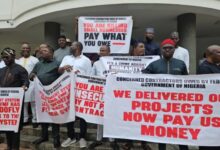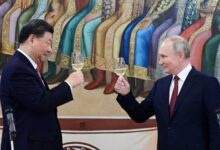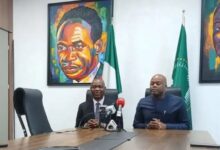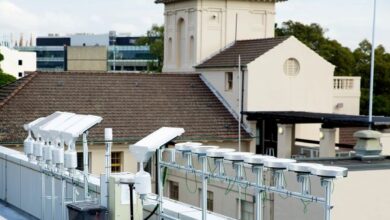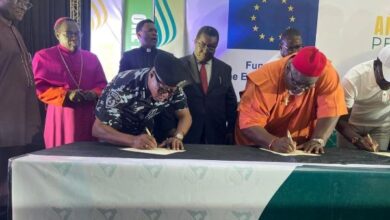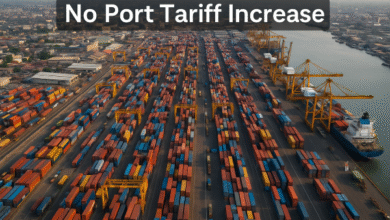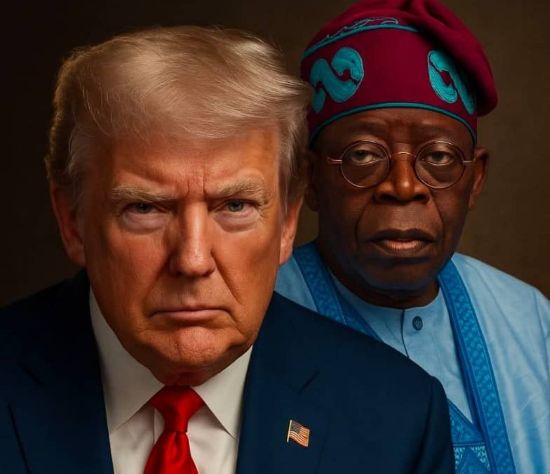
The renewed controversy over alleged Christian genocide in Nigeria has reignited old diplomatic tensions — this time with U.S. President Donald Trump threatening to launch military action against Africa’s most populous nation, Nigeria, over what he described as “mass killings of Christians by terrorists.”
Trump’s inflammatory remarks, amplified across Western conservative networks, have sparked alarm within diplomatic circles. His declaration that the U.S. could go into Nigeria “guns-a-blazing” has drawn sharp reactions from Abuja, which insists that his claims distort the complex reality of Nigeria’s security landscape.
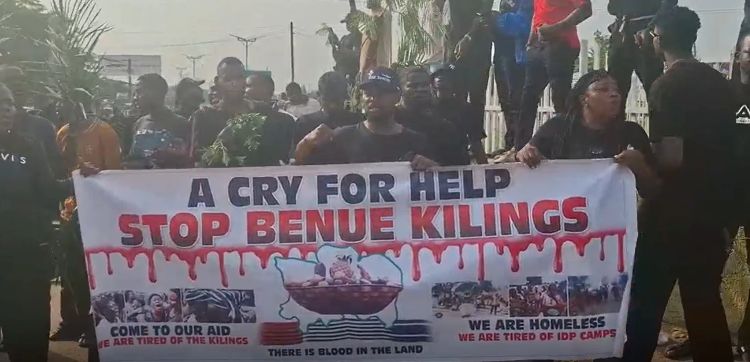
The Accusation: A Trumpian Rhetoric Meets a Nigerian Rebuttal
In a post on Truth Social, Trump accused Nigerian authorities of tolerating “radical Islamists” who are “massacring Christians.” He declared Nigeria a “Country of Particular Concern (CPC)” — a status under U.S. law reserved for states accused of gross violations of religious freedom — and ordered the Pentagon to “map out a possible strike plan.”
“If the Nigerian Government continues to allow the killing of Christians,” Trump wrote, “the U.S.A. will immediately stop all aid and assistance to Nigeria and may go in to wipe out the Islamic terrorists.”
This renewed “Trump Doctrine” on Nigeria — muscular, unilateral, and faith-driven — has revived the old question: where does religious freedom end and geopolitics begin?
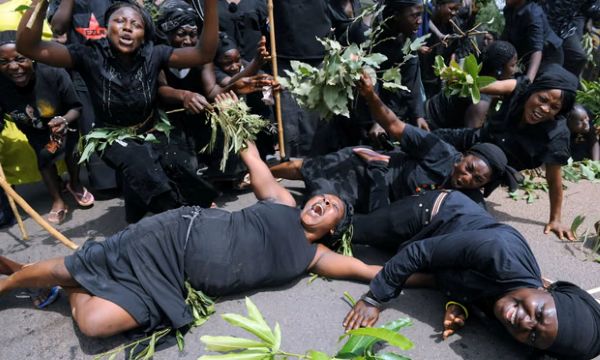
Nigeria Pushes Back: “This Is Not a Religious War”
Nigeria’s response has been swift and firm.
President Bola Ahmed Tinubu, through official channels, dismissed Trump’s remarks as “misguided and inaccurate,” insisting that Nigeria’s conflicts are driven by economic, ethnic, and security dynamics — not religion.
“Religious freedom and tolerance remain the bedrock of Nigeria’s national identity,” Tinubu said. “Portraying our nation as religiously intolerant distorts decades of coexistence between Christians and Muslims.”
Nigeria’s Minister of Information, Mohammed Idris, reinforced this position, clarifying that terrorist groups — including Boko Haram and ISIS affiliates — have targeted both Christians and Muslims.
“Criminals don’t ask for one’s faith before attacking,” he said. “This violence is not religious, it’s a war against Nigeria itself.”
Between the Pulpit and the Pentagon
Trump’s post reflects a rising wave of religious nationalism in U.S. conservative politics, where African conflicts are often viewed through an evangelical lens.
Several U.S. lawmakers, including Senator Ted Cruz and Representative Riley Moore, have pressed for sanctions against Nigeria, alleging state-backed persecution of Christians.
Moore claimed “over 7,000 Christians” were killed in 2025 alone, citing unverified NGO data — a figure Nigeria strongly disputes.
“This is not about faith; it’s about facts,” said Kimiebi Ebienfa, spokesman for Nigeria’s Ministry of Foreign Affairs. “The U.S. needs a fuller understanding of our context before making sweeping designations.”
Diplomatic analysts warn that the CPC label — previously imposed in 2020 and lifted in 2021 under President Biden — could strain Washington-Abuja ties, complicating defense cooperation, trade, and intelligence sharing in West Africa.
The Plateau Tragedy and the Politics of Perception
Footage of recent killings in Plateau State, shared by local clergy, fueled the narrative of Christian persecution.
But field investigations reveal that some attacks indeed stem from land disputes between herders and farmers, both Christian and Muslim, aggravated by climate change, poverty, and weak governance. There are however alleged reports of land-grabbing by foreign mercenaries who chase out indigenous people from ancestral lands in order to take over their mineral-rich lands for illegal mining activities.
While Christian leaders decry “targeted killings,” community monitors say the violence reflects a broader collapse of local security structures — not a coordinated religious purge.
“Terror doesn’t wear a religion,” says Rev. Solomon Aluko, a Jos-based peace mediator. “In this war, both churches and mosques have buried their dead.”
How Government ineffective actions Fuel Endless Killings
Amid growing global outrage over Nigeria’s endless cycle of mass killings, alleged ethnic invasions, and rural massacres, questions are mounting about whether the Nigerian government has lost both grip and moral authority in protecting its citizens.
Recent warnings by U.S. President Donald Trump, who threatened possible American intervention over what he termed the “systematic slaughter of Christians by Islamist militants”, have drawn renewed attention to a humanitarian tragedy long left to fester — one that successive Nigerian governments have struggled, and some say, refused, to confront decisively.
The Unending Crisis: When Blood Becomes a Statistic
Across Nigeria’s north-central and northwest regions, communities are under siege. Villages have been burned, farmers displaced, and thousands killed in attacks carried out by heavily armed militias often described by government statements as “unknown gunmen.”
These killings of Christians and non-Christians— whether in Plateau, Kaduna, Benue, Zamfara, or Katsina — follow a grim pattern: waves of coordinated assaults on unprotected settlements, the looting of livestock and minerals, and the silence that follows from officialdom.
Each massacre is greeted with the same refrain: “We condemn the killings and will deploy both kinetic and non-kinetic measures.” But on the ground, what citizens experience is paralysis — a state that neither secures its people nor punishes their attackers.
The Illusion of Strategy: Nigeria’s “Kinetic and Non-Kinetic” Failure
For over a decade, Nigeria’s leadership has leaned on a tired script — the so-called “kinetic and non-kinetic approach” to combating terrorism. It has become a convenient slogan rather than a functional security doctrine.
The “kinetic” side implies military action; the “non-kinetic” supposedly means dialogue, amnesty, and reintegration of “repentant” terrorists. In reality, both have failed spectacularly.
Armed groups continue to expand their footprint — from Boko Haram in the northeast to bandits in the northwest and extremist herder militias in the Middle Belt — with little consequence. Some of their leaders have even been granted public leniency, amnesties, and, in some cases, social reintegration programmes that appear to reward violence with legitimacy.
This policy of appeasement, critics argue, sends the wrong message: that the Nigerian state is more comfortable negotiating with killers than defending the innocent.
The Deep Rot: Conflict as a Cash Cow
Behind Nigeria’s security paralysis lies a darker truth — a governance system where prolonged conflict appears to benefit the few rather than burden them.
Every fiscal year, defense and security budgets balloon, consuming trillions of naira. Yet, citizens continue to die in their homes without protection. Rural security remains skeletal; displaced persons camps are underfunded; and military hardware acquisition trails years behind global standards.
Analysts within the defence community have repeatedly raised concerns that endless insecurity sustains a political economy of conflict — one where vested interests thrive on opaque spending, unmonitored contracts, and exaggerated budgetary provisions.
As a result, Nigeria’s war economy has evolved into a self-perpetuating machine — one that feeds on fear, funds inefficiency, and fails those it was meant to protect.
Forgotten Victims, Forgotten Justice
From Benue to Borno, from Zamfara to Plateau, victims’ families rarely see justice. Arrests are announced but prosecutions are scarce. Truth commissions fade into silence, and investigative panels become archives of unimplemented reports.
For many survivors, the trauma is doubled — first by violence, then by neglect.
Communities rebuild with no compensation, or worse, are forced to coexist with their aggressors under government peace pacts.
“It’s like dying twice — once to the gun, and again to the silence that follows,” says a civil society leader in Jos, Plateau State.
Decades of humanitarian fatigue and political indifference have desensitized much of the nation. Every new headline of slaughter reads like an old one — familiar, tragic, and quickly forgotten.
Global Spotlight, Domestic Shadows
President Trump’s explosive warning has reopened global debate about religious persecution and state accountability in Nigeria. His declaration that “Christianity faces an existential threat in Nigeria” has been welcomed by some Western conservatives but rejected by Abuja as “misguided.”
Yet, beneath the diplomatic tension lies a truth that cannot be ignored: Nigeria’s failure to protect its citizens has created a vacuum now being filled by foreign outrage.
When global leaders, NGOs, and international watchdogs begin to define a country’s human rights record more than its own institutions, it signals a collapse not of faith — but of governance.
The Cost of Official Silence
The Nigerian state’s moral credibility has eroded not merely because of the killings, but because of its routine normalization of them.
Each statement of condemnation without consequence emboldens the killers and diminishes national trust.
🔹 1. From Defence to Dependency:
Security institutions have become reactive, not preventive — responding after lives are lost, not before. The militarization of governance has done little to restore stability.
🔹 2. From Accountability to Apathy:
Years of unimplemented white papers and unprosecuted massacres have built a culture of impunity that eats away at the rule of law.
🔹 3. From Leadership to Lethargy:
While officials trade statements and committees, thousands remain displaced in their own homeland — a humanitarian failure that betrays the essence of governance.
🔹 4. From Faith to Fracture:
Religious rhetoric — whether from within or abroad — is inflaming tensions in a country that once prided itself on coexistence. True peace will require not foreign threats but domestic courage.
The Road Forward: Justice or Just Words?
For Nigeria to reclaim its humanity and sovereignty, it must rebuild from within — through accountability, community-led policing, equitable justice, and a transparent audit of all defence spending.
It must prove, not declare, that every Nigerian life matters — whether in Bama or Benin, Jos or Jigawa.
Until then, slogans about “renewed hope” will ring hollow against the gunfire echoing across the land.
BRANDECONOMY ANALYSIS: Between Diplomacy, Faith, and Fragile Realities
The Trump declaration revives a dangerous oversimplification — viewing Nigeria’s multifaceted crisis through a single lens of faith-based persecution.
This framing, while politically potent in U.S. conservative circles, risks undermining Nigeria’s sovereignty and aggravating sectarian suspicion at home.
BRANDECONOMY’s analysis identifies three critical fault lines emerging from this confrontation:
1️⃣ The Weaponisation of Faith in Global Politics
Trump’s rhetoric merges religious sentiment with foreign policy, transforming faith into a political weapon.
In an election climate where evangelical support remains key, such messaging plays well domestically but erodes America’s credibility as a neutral global arbiter.
2️⃣ Nigeria’s Diplomatic Balancing Act
Nigeria must now navigate the thin line between defending its image and maintaining vital U.S. cooperation in counterterrorism and economic aid.
Experts warn that failure to engage Washington constructively could revive isolation reminiscent of Nigeria’s post-Abacha years.
3️⃣ The Bigger Crisis: Governance, Not Genocide
While religion provides an emotive headline, the root causes of Nigeria’s violence are structural — unemployment, desertification, weapons proliferation, and institutional fragility.
Until these are addressed, the country remains vulnerable to extremist exploitation on both sides of the faith divide.
The Road Ahead: Diplomacy Over Drama
Former Senate Leader Ali Ndume has called for “seasoned diplomatic engagement” to de-escalate tensions.
“Washington must hear the Nigerian perspective,” he said. “This isn’t about Christians or Muslims — it’s about Nigerians dying.”
As Abuja intensifies dialogue through its embassies and regional blocs, global observers insist that multilateral cooperation — not moral grandstanding — holds the key to peace.
In the words of a senior ECOWAS diplomat:
“What Nigeria needs is partnership, not posturing. The world must help strengthen its institutions, not divide its people.”
Conclusion
Trump’s threat of military action may have electrified online audiences, but it underscores a deeper global dilemma — how misinformation, faith politics, and digital populism can collide to distort international diplomacy.
For Nigeria, this moment is not just a test of sovereignty; it’s a call to reassert its voice on the global stage and redefine the narrative of Africa’s largest democracy.
In the final analysis, the challenge is not about Christianity or Islam.
It’s about truth, justice, and the shared humanity that binds every Nigerian.


